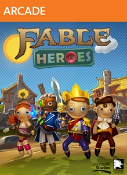
The cornerstone of the Fable series, starting with the very first game, was to bring some degree of innovation to the RPG formula. This puts Fable Heroes in an odd position, as it merely exists to capitalize on the merits of Fable III by borrowing its characters and locales for a mindless beat-'em-up. Puppetized versions of the cast make their way through the bright and cheery fabric version of Albion, killing a variety of equally colorful enemies. However, devoid of any challenge or strategy, Fable Heroes serves very little purpose and offers almost nothing to appreciate.
With up-to-four player local multiplayer, Fable Heroes seems like it should be instantaneous fun for a group of friends. Unfortunately, it's anything but even if you manage to get a group that large together. As a team of four, whether you have the requisite number of human players or not, you'll proceed through various locales of Albion, defeating every enemy that springs forth without exerting the least bit of effort.

Though this is typical fare for a game in the genre, Fable Heroes doesn’t seem to capture the magic that the Konami arcade classics did. This is due in part to the minute attack repertoire. While you technically have two attacks, one weak and one strong (flourish), the "weak" attack seems mostly on par with the strong attack. The only exception is that the weak attack executes nearly instantaneously, making it a much more useful and functional maneuver. As such, if you ever do decide to use the flourish attack, it's only to break the monotony of jamming the weak attack button nonstop from the beginning of the level to the end.
Most of your effort will be put into collecting the coins that spring forth from defeated enemies before they disappear. Aside from the requisite pissing contest that measures who can collect the most to "win" the level, these coins are used to upgrade your character between levels. However, this builds into the most contrived part of the title– the board game.
After you complete a given level you'll be transported to the game board where, depending on your level performance, you'll get a certain number of dice rolls. This moves your character along a board with a variety of spaces, each of which offers different upgrades that you must pay for with the coins you've collected. In the beginning, it's easy to upgrade your character, but as the quest presses onward it gets harder and harder to get that lucky roll that will allow you to fully upgrade. Not only is the board game pointless, but it obscures the ability to level up, which is typically the most redeeming part of the Fable series. Reusing the Road to Rule from Fable III would’ve been a more preferable (and logical) choice for a leveling system.

Even beyond the monotonous gameplay and the game board, Fable Heroes suffers from camera issues and visual design flaws. With brightly colored enemies, visually similar human players, and bright landscapes, everything meshes together making it extremely tough to pinpoint your character amidst the chaos. Couple this with the awkward camera angle and it can be off-putting to even view the game in motion.
Never mind the game's numerous other issues, like incompetent NPCs, boring level designs, and levels locked pending the release of Fable: The Journey; Fable Heroes simply isn't worth even a cursory glance. Young children may appreciate the visual aesthetic and simplistic gameplay, but there are undoubtedly better choices, like the aforementioned Konami arcade classics available on XBLA.
Review Policy
In our reviews, we'll try not to bore you with minutiae of a game. Instead,
we'll outline what makes the game good or bad, and focus on telling you whether
or not it is worth your time as opposed to what button makes you jump.
We use a five-star rating system with intervals of .5. Below is an outline of
what each score generally means:

All games that receive this score are
standout games in their genre. All players should seek a way to play this game.
While the score doesn't equate to perfection, it's the best any game could conceivably do.

These are above-average games that most players should consider purchasing. Nearly
everyone will enjoy the game and given the proper audience, some may even love these
games.

This is our middle-of-the-road ranking. Titles that receive three stars may not make
a strong impression on the reviewer in either direction. These games may have some
faults and some strong points but they average out to be a modest title that is at
least worthy of rental for most.

Games that are awarded two stars are below average titles. Good ideas may be present,
but execution is poor and many issues hinder the experience.

Though functional, a game that receives this score has major issues. There are little
to no redeeming qualities and should be avoided by nearly all players.

A game that gets this score is fundamentally broken and should be avoided by everyone.













Comments